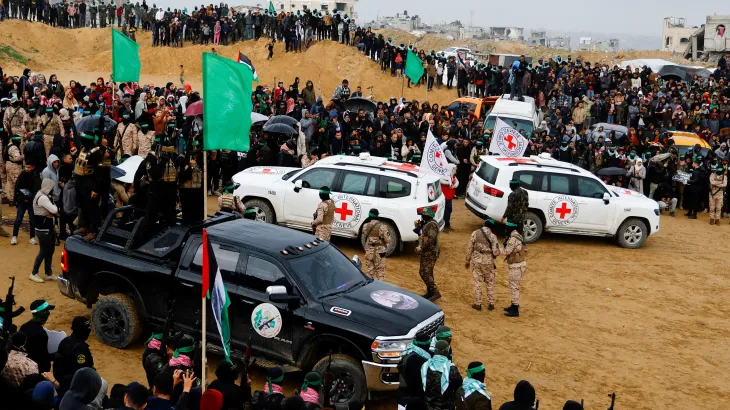Hamas has returned the bodies of four Israeli captives, including members of the Bibas family, in Gaza’s Khan Younis. The handover marks a significant moment in the ongoing conflict as both sides navigate a delicate ceasefire. While the transfer of the bodies may be seen as a step toward de-escalation, deep-rooted tensions and unresolved disputes continue to threaten the fragile truce.
The return of the captives’ bodies follows extended negotiations between Hamas and Israeli authorities, facilitated by international mediators, including Qatar and Egypt. While Israel has been demanding the release of both living hostages and the bodies of deceased captives, Hamas has conditioned such moves on broader agreements regarding ceasefires, prisoner exchanges, and humanitarian aid access.
Despite the ongoing ceasefire, authorities in Gaza have accused Israel of restricting the entry of much-needed humanitarian aid. They claim Israel is preventing the delivery of 135,000 mobile homes meant to shelter displaced families, as well as blocking most of the 500 bulldozers and other essential aid that were promised in the first phase of the truce agreement. These delays have exacerbated the already dire humanitarian situation in Gaza, where hundreds of thousands of people remain displaced, and basic supplies like food, clean water, and medical aid are scarce.
The restrictions have sparked outcry from international humanitarian organizations, who warn that continued delays could lead to a deepening crisis. The United Nations and several aid groups have urged Israel to allow full access to humanitarian shipments to alleviate the suffering of civilians.
The conflict is also affecting neighboring Lebanon, where President Joseph Aoun has reiterated calls for Israel to withdraw from southern Lebanon. His statement comes after the deadline for a complete Israeli withdrawal, agreed upon in past negotiations, expired earlier this week.
Tensions along the Lebanon-Israel border have escalated in recent months, with Hezbollah, a powerful Lebanese militant group allied with Hamas, engaging in periodic clashes with Israeli forces. The group has vowed to support Palestinian resistance, leading to fears of a broader regional conflict.
As the war continues, the humanitarian cost remains devastating. Gaza’s Health Ministry has confirmed that at least 48,297 Palestinians have been killed, with another 111,733 wounded. However, the Government Media Office in Gaza has provided a higher estimate, claiming the death toll has surpassed 61,709, as thousands remain trapped under rubble and are presumed dead.
These figures reflect the immense destruction caused by Israeli airstrikes and ground operations in Gaza. Many of the casualties include women and children, intensifying international criticism of Israel’s military campaign. Global human rights organizations and several countries have condemned the excessive use of force, urging Israel to adhere to international laws governing armed conflicts.
The latest round of violence was triggered by the Hamas-led attack on Israel on October 7, 2023, which left 1,139 people dead and resulted in over 200 hostages being taken into Gaza. The attack marked one of the deadliest days in Israel’s history and led to an unprecedented military response from the Israeli government.
The conflict has since spiraled into one of the deadliest wars in the region in recent history. While international mediators continue efforts to broker a long-term ceasefire and a potential hostage exchange deal, the situation remains volatile, with both sides holding firm to their demands.
Despite temporary ceasefires and intermittent negotiations, a lasting peace agreement remains elusive. Israeli Prime Minister Benjamin Netanyahu has maintained a hardline stance, vowing to dismantle Hamas completely, while Hamas insists that any long-term ceasefire must include a complete Israeli withdrawal from Gaza and the West Bank.
International diplomatic efforts, led by the United States, Egypt, Qatar, and the United Nations, continue, but progress has been slow. The deep-seated mistrust between both parties, coupled with the ongoing humanitarian crisis, makes the prospect of a lasting resolution uncertain.
As the war rages on, the world watches with bated breath, hoping for an end to the bloodshed and suffering in the region.



